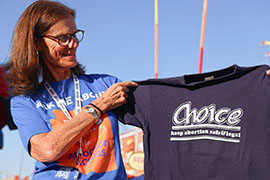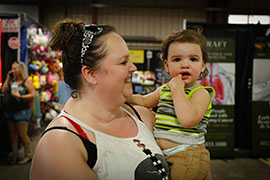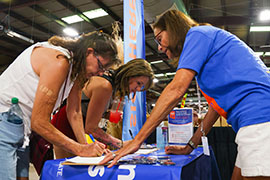EDS: An earlier version of this story incorrectly identified Reproductive Freedom for All Arizona in the seventh graf. The story below has been corrected, but clients who used previous versions are asked to run the correction found here.
- Slug: BC-CNS-Abortion Fair,880 words.
- 6 photos available (thumbnails, captions below).
By Oakley Seiter
Cronkite News
PHOENIX – An Arizona health care advocacy group reached out to people at the recent Arizona State Fair to ask registered voters to sign a petition supporting a ballot initiative that would amend the Arizona Constitution to establish abortion access as a fundamental right.
One of the groups’ volunteers, Janet Hamlin, was there to talk about why she has always supported a woman’s right to choose.
“This is a really big issue for me because I suffered multiple miscarriages, and for one of my miscarriages I needed a medical procedure,” Hamlin said. “I am concerned that procedures like I needed could not have providers willing to provide that or it could be banned. Women’s health care is health care and it is critical.”
Hamlin is one of the many people advocating for increased abortion access in Arizona since the Supreme Court overturned Roe v. Wade on June 24, 2022. Later in 2022, an Arizona law went into effect limiting abortion access to 15 weeks of pregnancy.
Healthcare Rising Arizona, an advocacy group that says it has more than 2,000 dues-paying members, tackles health care issues through “ballot box, direct action, and legislation.” The group operated a booth at the Arizona State Fair, where it asked registered voters for their support by signing a petition to put abortion access on Arizona’s general election ballot for 2024.
Hamlin worries that limits on abortion access also will limit other medical procedures. “If you are pregnant and your fetus dies after 15 weeks, and you don’t miscarry on your own, you need a medical procedure. It is not safe to be carrying dead tissue in your body,” she said. “Those procedures should be available without being questioned, without you being given a hard time. It’s a loss and it’s devastating, you don’t need to be asked questions when you’re already in an emotional state.”
Healthcare Rising is working alongside Planned Parenthood Advocates of Arizona, the American Civil Liberties Union of Arizona, Affirm Sexual and Reproductive Health, Arizona List and Reproductive Freedom for All Arizona (formerly known as NARAL Arizona) to collect 383,923 signatures by July 3 to get the initiative on the ballot for 2024. Similar constitutional amendments have been passed in California, Michigan and Vermont.
“When you start to restrict care, you start to restrict providers, and the more you restrict providers, I would think you’re starting to restrict access in lower-income communities and for people who have difficulty with transportation. This could impact the clinics that women need to go to for their reproductive health care,” Hamlin said. “Safety is a concern … women’s health care should be available all over.”
According to the 2021 Abortion Report compiled by the Arizona Department of Health Services, Latino and Hispanic Arizonans represent the largest racial demographic receiving abortions in the state, while Black women receive abortions at almost three times the rate of their white counterparts. The U.S. Census Bureau statistics show that Hispanic and Black households in Arizona are more likely than white households to live under the poverty level.
A 2023 Women’s Health Policy report from KFF points out that abortions can be costly, especially if they involve travel or other nonmedical costs such as child care or lost wages. “In 2021, the median costs for people paying out of pocket in the first trimester were $568 for a medication abortion and $625 for a procedural abortion” the report said. “The Federal Reserve estimates that nationally about one-third of people do not have $400 on hand for unexpected expenses. For low-income people, who are more likely to need abortion care, these costs are often unaffordable.”
While some states will fund abortions for low-income residents with state money, Arizona is one of 34 states that does not. Low-income women in those states are subject to the federal budget’s Hyde Amendment, which prohibits the use of federal funds for abortion except in cases of rape, incest, or when a woman’s life is at risk.
According to KFF, Arizona does not pay for abortions beyond the Hyde Amendment limits, despite court orders directing them to do so.
The people who stopped by the Healthcare Rising Arizona booth at the state fair expressed a range of opinions on abortion access.
James Gow, who referred to himself as an ex-pastor, signed the petition at the fair and shared his thoughts:
“I want people to understand that it should be a choice for everyone, and whether you believe in it or not, it’s none of your business. If you don’t want to do it, don’t do it, but if you want to do it, it’s your right and your choice,” Gow said.
His wife, Sabrina Gow, had a different opinion and did not sign the petition:
“I do believe that once a baby is conceived in the womb that they actually are a person already, and they don’t deserve to be killed like anyone else,” she said.
Family friends Natalie Wolfsen and Heidi Bell both signed the petition before heading back to the fairgrounds with their children.
“The issue is political,” said Wolfsen, “but it should be about health care.”
On Monday, the Ninth Circuit Court of Appeals ruled that a group of Arizona doctors suing the state has legal standing to challenge a 2021 state law prohibiting abortions for genetic abnormalities of a fetus. Read more about the decision here.
For more stories from Cronkite News, visit cronkitenews.azpbs.org.
^__=
Healthcare Rising Arizona seeks to gather signatures from voters at the Arizona State Fair to add abortion access to the general election ballot in 2024. (Photo by John Leos/Cronkite News)
Healthcare Rising Arizona volunteer Barbara Finn shows off a shirt she received while protesting for legalized abortion access in the 1980s. “I never thought I’d have to pull this shirt out again.” (Photo by John Leos/Cronkite News)
Jadie Grahn, 42, smiles at her 15-month- old son, Ace, after signing the petition to add abortion access to the Arizona’s 2024 general election ballot. After working as a labor and delivery nurse, Grahn signed the petition knowing the negative impact unintended pregnancies have on low-income people or people suffering from drug addiction. (Photo by John Leos/Cronkite News)
Janet Hamlin volunteers for Healthcare Rising Arizona’s efforts to collect signatures to add abortion access to the general election ballot in 2024 by sharing her personal experience with medical abortion. (Photo by John Leos/Cronkite News)
From left, Heidi Bell and Natalie Wolfson signing the petition to add abortion access to the 2024 general election ballot in Arizona after speaking with Healthcare Rising Arizona volunteer, Barbara Finn. (Photo by John Leos/Cronkite News)
Delia Romero, 23, signs the petition to add abortion access to Arizona’s 2024 general election ballot at Healthcare Rising Arizona’s outreach table at the Arizona State Fair on Oct. 19, 2023. “I do have a younger sister so I do want her to have that available if she needs it, because who am I to judge?” (Photo by John Leos/Cronkite News)





